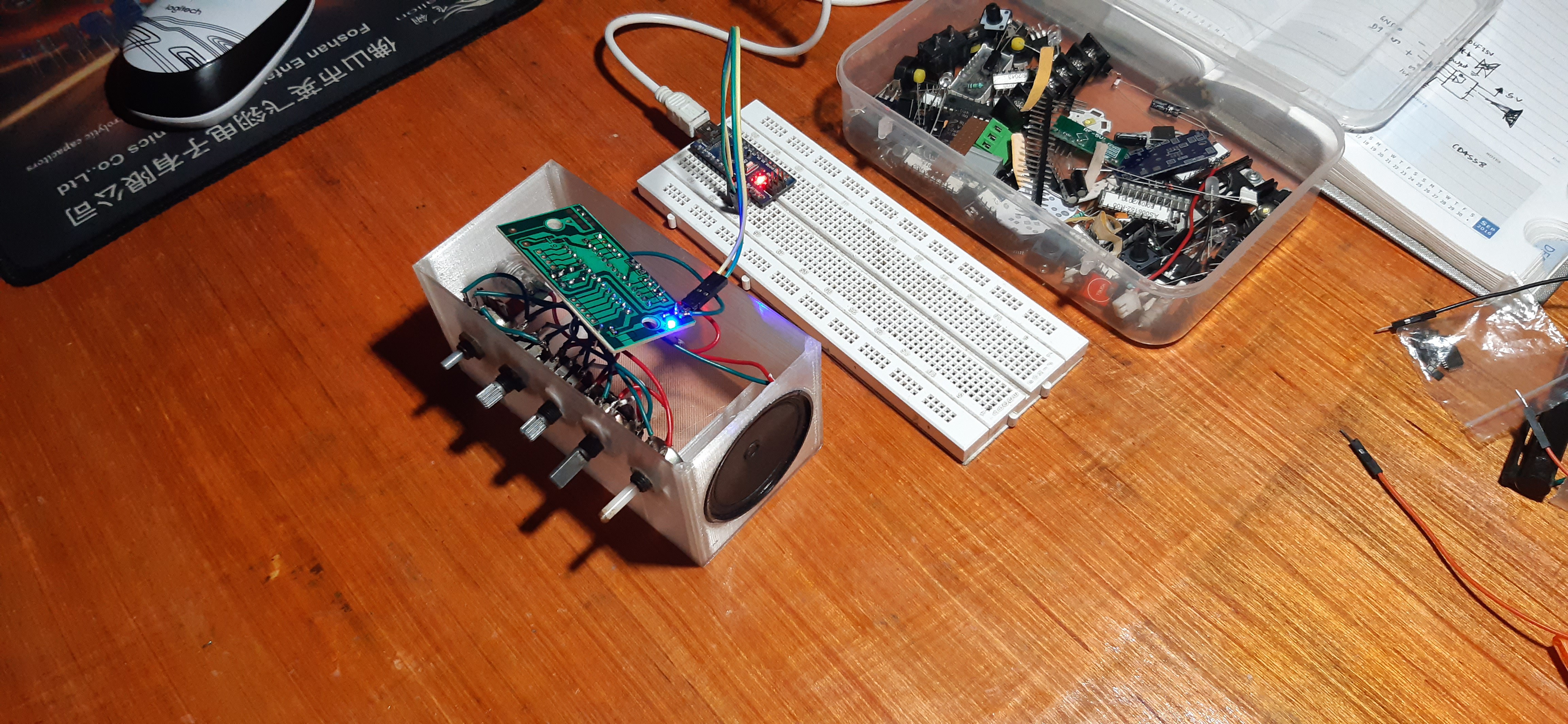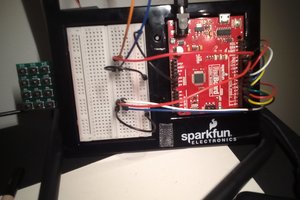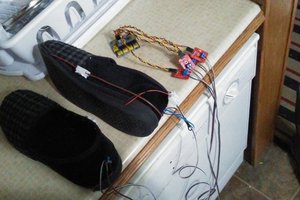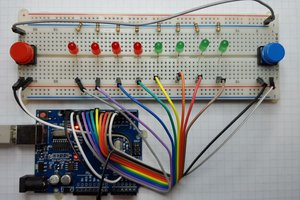
first, I Designed the base body in Fusion360 and 3D printed it on my Ender 3.
then I just put everything together like a jigsaw puzzle.
the main part of the heart of this project is the Mozzi Library here's the link for downloading it. http://sensorium.github.io/Mozzi/
after installing it, I uploaded the sketch based on this library to my Minimal Arduino Uno PCB which is basically a Breakout board for Atmega328PU (originally I made the circuit for a different thing but I end up using it instead of using a dot circuit board.
results were good but the sound is not loud because I have connected the speaker directly with Digital Pin 9
(will be adding an OPAMP circuit in this in future)
CODE-
#include <MozziGuts.h>
#include <Oscil.h> // oscillator #include <tables/cos2048_int8.h> // table for Oscils to play
#include <Smooth.h>
#include <AutoMap.h> // maps unpredictable inputs to a range // int freqVal; // desired carrier frequency max and min, for AutoMap
const int MIN_CARRIER_FREQ = 22;
const int MAX_CARRIER_FREQ = 440;
const int MIN = 1;
const int MAX = 10;
const int MIN_2 = 1;
const int MAX_2 = 15;
// desired intensity max and min, for AutoMap, note they're inverted for reverse dynamics
const int MIN_INTENSITY = 700;
const int MAX_INTENSITY = 10;
// desired mod speed max and min, for AutoMap, note they're inverted for reverse dynamics
const int MIN_MOD_SPEED = 10000;
const int MAX_MOD_SPEED = 1;
AutoMap kMapCarrierFreq(0,1023,MIN_CARRIER_FREQ,MAX_CARRIER_FREQ);
AutoMap kMapIntensity(0,1023,MIN_INTENSITY,MAX_INTENSITY);
AutoMap kMapModSpeed(0,1023,MIN_MOD_SPEED,MAX_MOD_SPEED);
AutoMap mapThis(0,1023,MIN,MAX);
AutoMap mapThisToo(0,1023,MIN_2,MAX_2);
const int KNOB_PIN = 0; // set the input for the knob to analog pin 0
const int LDR1_PIN=1; // set the analog input for fm_intensity to pin 1
const int LDR2_PIN=2; // set the analog input for mod rate to pin 2
const int LDR3_PIN=4;
const int LDR4_PIN=3;
Oscil<COS2048_NUM_CELLS, AUDIO_RATE> aCarrier(COS2048_DATA);
Oscil<COS2048_NUM_CELLS, AUDIO_RATE> aModulator(COS2048_DATA);
Oscil<COS2048_NUM_CELLS, CONTROL_RATE> kIntensityMod(COS2048_DATA);
int mod_ratio = 5; // brightness (harmonics)
long fm_intensity; // carries control info from updateControl to updateAudio
// smoothing for intensity to remove clicks on transitions
float smoothness = 0.95f;
Smooth <long> aSmoothIntensity(smoothness);
void setup(){
// Serial.begin(115200); // set up the Serial output so we can look at the light level startMozzi(); // :))
}
void updateControl(){ // freqVal = map(LDR3_PIN, 0, 1023, 1, 100); int freqVal = mozziAnalogRead(LDR3_PIN); // value is 0-1023 int FRQ = mapThis(freqVal); int knob2 = mozziAnalogRead(LDR4_PIN); // value is 0-1023 int knob2Val = mapThis(knob2); // read the knob int knob_value = mozziAnalogRead(KNOB_PIN); // value is 0-1023 // map the knob to carrier frequency int carrier_freq = kMapCarrierFreq(knob_value); //calculate the modulation frequency to stay in ratio int mod_freq = carrier_freq * mod_ratio * FRQ; // set the FM oscillator frequencies aCarrier.setFreq(carrier_freq); aModulator.setFreq(mod_freq); // read the light dependent resistor on the width Analog input pin int LDR1_value= mozziAnalogRead(LDR1_PIN); // value is 0-1023 // print the value to the Serial monitor for debugging //Serial.print("LDR1 = "); // Serial.print(LDR1_value); // Serial.print("\t"); // prints a tab
int LDR1_calibrated = kMapIntensity(LDR1_value); // Serial.print("LDR1_calibrated = "); // Serial.print(LDR1_calibrated);
// Serial.print("\t"); // prints a tab // calculate the fm_intensity fm_intensity = ((long)LDR1_calibrated * knob2Val * (kIntensityMod.next()+128))>>8; // shift back to range after 8 bit multiply
// Serial.print("fm_intensity = "); // Serial.print(fm_intensity);
// Serial.print("\t"); // prints a tab // read the light dependent resistor on the speed Analog input pin int LDR2_value= mozziAnalogRead(LDR2_PIN); // value is 0-1023
// Serial.print("LDR2...
Read more »
 Arnov Sharma
Arnov Sharma
 Kai
Kai
 Clay Shippy
Clay Shippy
 Hari Wiguna
Hari Wiguna